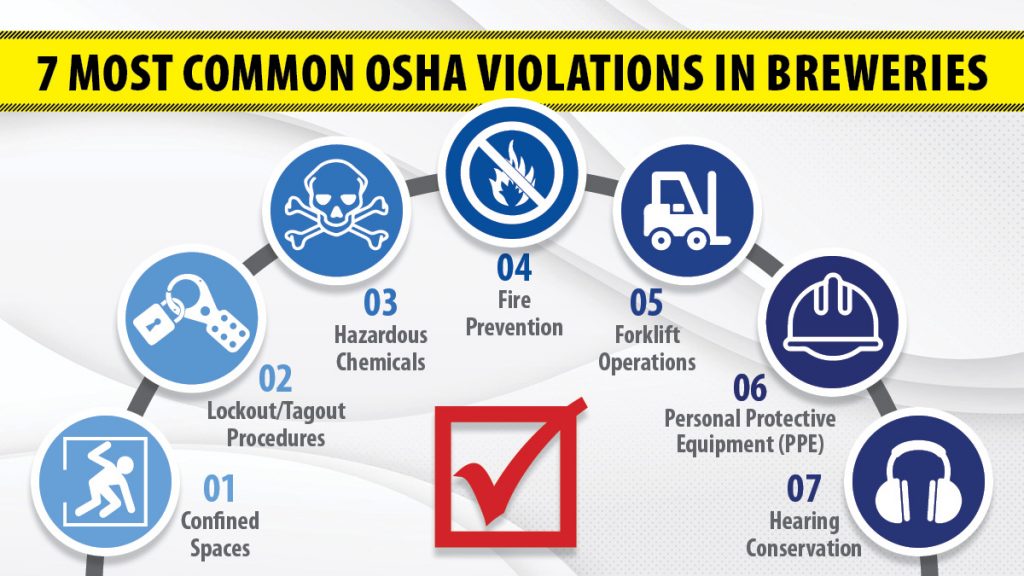Companies that practice a safety-first philosophy can expect fewer employee injuries and greater productivity and employee engagement. One of the most effective ways to design a safety culture is to make sure all employees are aware of potential risks that exist in their work environment and the proper procedures that can prevent injuries from happening. Here are seven most commonly cited OSHA violations in breweries, what you should know about each, and the policies that should be in place to achieve a safety-first culture:
- Confined Spaces. OSHA requires breweries to identify all confined spaces and then evaluate them to see if they require a permit for entry. If so, management must develop a permit system, train employees, and create entry/rescue procedures.
- Lockout/Tagout Procedures. OSHA mandates lockout/tag-out procedures for equipment maintenance and servicing where unexpected and hazardous energy could be released. Brewery management must develop a written program that requires all energy sources to be identified and securely de-energized during maintenance work.
- Hazardous Chemicals. OSHA requires a written Hazard Communication (HAZCOM) program that includes an inventory of all hazardous chemicals in the brewery. Every container of hazardous chemicals should have a proper label or be tagged and sealed appropriately when not in use. Employees need training on how to handle and monitor chemicals and perform regular maintenance of safety data sheets.
- Fire Prevention. OSHA requires breweries to have a written fire prevention plan for all facilities with more than ten employees. The program should list on-site fire hazards and designate which employees are responsible for maintaining fire control and prevention equipment. Emergency exits should be marked, and the pathways to those exits should be clear at all times. In case of a fire, employees should know how to evacuate or treat burns on-site if needed.
- Forklift Operations. According to OSHA, employers must ensure each powered industrial truck operator is competent and has completed training and evaluation. Forklift operator training should include formal (classroom) instruction, practical (on-the-job) instruction, and evaluation of the operator’s abilities. Employees also need training in proper ergonomic lifting techniques for transporting smaller items around the brewery.
- Personal Protective Equipment (PPE). PPE can range from protective eyewear, earplugs or muffs, hard hats, and footwear to gloves, clothing, and respiratory gear. Employers should assess the brewery to see where hazards exist and then provide the appropriate PPE. Training should also be made available on how to use and maintain the equipment properly.
- Hearing Conservation. Occupational noise levels within the brewery must be evaluated and addressed accordingly. OSHA requires employers to have a hearing conservation program in place for workers exposed to a time-weighted average noise level of 85 decibels or higher over an 8-hour work shift. The program must include noise monitoring, employee training, and periodic hearing exams. Employers also have to provide protective hearing devices like earplugs or muffs in high-risk environments.
One-Stop-Shop for Safety Services
Safety Solutions and Supply are consulting professionals who partner directly with your business to create cost-efficient safety programs tailored to your needs. We provide expert consultation, meet and exceed regulatory requirements, and we have a cost-effective implementation of the following:
- Site Evaluation. We provide a complete risk reduction and hazard assessment and a gap analysis report to identify necessary control measures needed.
- Customized Training. Our specialized safety training courses offer a positive, interactive learning environment. Our programs are industry-specific to address the challenges you and your employees face.
- Program Development. Our consultants develop written safety programs and manuals, employee training strategies, and technical support solutions customized to your company.

